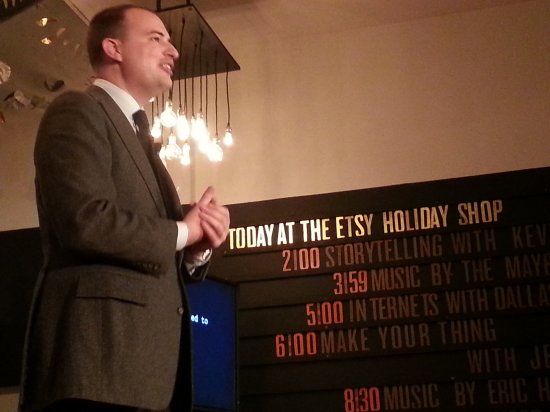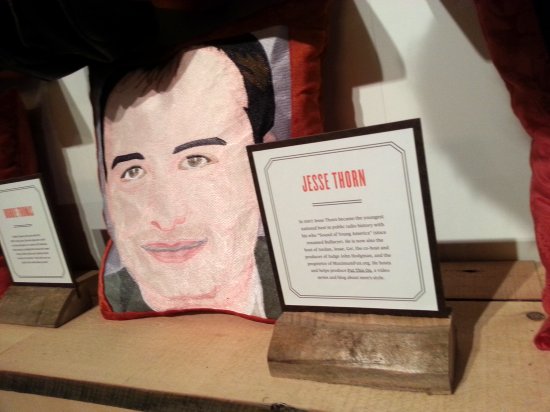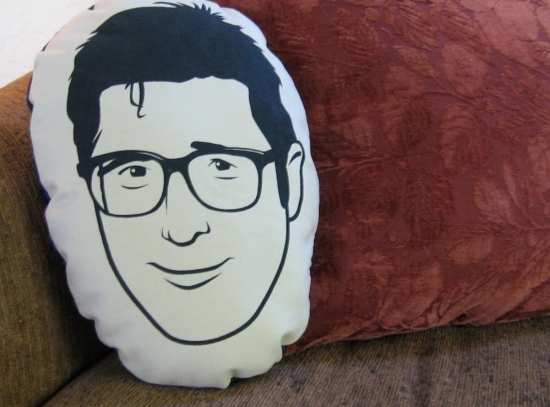Bullseye’s Jesse Thorn on How and Why to Make Your Thing
Jesse Thorn is kind of my hero. My first “editor’s pick” here at Geekosystem was his public radio show and podcast Bullseye, and I made it my first recommendation for a reason. It’s really something special. When I found out Thorn was doing his talk “Make Your Thing” here in New York, well I certainly wasn’t going to miss that. I had a chance to sit down with Jesse before the talk at the Etsy Holiday Pop-Up Shop to discuss making our things, sincerity, and what it means to be a geek.
Thorn is the proprietor of the Maximum Fun network of podcasts, several of which he hosts. He also writes the menswear blog Put This On, and is credited with starting a philosophy that rejects irony and cynicism, and celebrates what’s awesome know as “The New Sincerity.” He also occasionally makes appearances to give a talk titled the “Make Your Thing: 12 Point Program for Absolutely 1000% No-Fail Guaranteed Success.”
At first blush that could seem like the kind of pseudo-inspirational money-making seminar one tends to find in a hotel ballroom on a Tuesday. If you don’t get the joke in the title it could make it seem even more like a Dale Carnegie seminar, but the fact that he performs it in places like an Etsy Holiday Pop-Up Shop for free should be a sign that it’s something very, very different.
“Make Your Thing” is about helping people be able to make creative work by showing them qualities that help make that possible. It isn’t a guide to financial success. It’s a guide for creative fulfillment. It uses as examples people who do happen to be successful, like Felicia Day, Chris Hardwick, and even the Insane Clown Posse. These people are successful, but not because they set out to make tons of money. They set out to do work they were passionate about and that was meaningful to them. That’s what “Make Your Thing” is about. Before the talk Jesse met with me at the Etsy Holiday Shop for an interview.
Geekosystem: We’re in the secret basement layer of the Etsy Holiday Shop, which you’re a curator of.
Jesse Thorn: Yeah, I’m guest curator I think?
What does that entail? I saw the display with your pillow face.
Yeah, a nice woman made a pillow with my face on it.
That’s the second time that’s happened, correct?
That’s the second time someone has made a pillow with my face on it, and this one is much nicer than the first one.
I would assume that’s two more times than you would have expected that to happen.
Yes, exactly. Look, I’m sure Tom Cruise, lots of people make pillows with his face on them. But if you called like, Ira Glass, who’s sort of in the same line of work as I am, but much more successful, zero people have ever made a pillow with his face.
I’m going to try to confirm that. I’ll see if he’ll return my email.
Basically the woman who’s programming this was familiar with me from Put This On, and one of the things we do on Put This On is celebrate craftsmanship and also second-hand and vintage goods, which are kind of the two things that Etsy does.
So why did you start trying to encourage people to make their thing?
I found that people were asking me. I did not think of myself as being an expert. I didn’t go to business school, or podcasting school, or menswear blogging school. I was an American Studies major, so I didn’t go to school for anything in particular, you know? I wrote papers about OutKast.
I was a Contemporary Arts major, so I’m in the same boat.
For many of the things I’ve done in my career, there’s been very little precedent, and so I didn’t set out to be a trailblazer, but it just sort of worked out that way.
You’re sort of a podcasting O.G.
I would be more than happy to just copy other people, but unfortunately at the time I couldn’t find a job and was doing my college radio show there was no one to copy. So I just sort of made my own way, and people ask me about stuff.
People ask me about stuff from what kind of microphones I use to essentially “How do I do what you’ve done?” Which is to make a job out of this. So I put together this talk, to show not just my own example, because I think one person’s example is not necessarily fully illustrative. But instead to show this group of a dozen or so people, many of whom I know, who have exemplified these qualities that I’ve seen in people who are doing this stuff successfully, that have led them to be able to do consistent creative work and connect with audiences. In the cases of the people in this example, they have also made it their jobs.
You mentioned that it’s some people you know, but there are also examples you give that are people that have qualities you admire, even though you don’t admire their work. I’m thinking in particular of the Insane Clown Posse.
I do not admire their work. At all.
It seems like an interesting choice to include.
Yeah, I mean, the truth is that I don’t think there’s anyone outside of maybe Avon or Harley Davidson, but certainly no creative people, that have done a better job of cultivating a community that sustains the business part of their creative work. I was joking around with the AV guy this morning when I came in to sound check, that he said “Wow, the Insane Clown Posse is still around?” and I said to him that not only are they still around, their last album was top 10 when it premiered.
They have a huge following.
It’s not even so much that they have a huge following, as that they have a passionate following. The reason is because they’re both reflective of and instigating an identity in their audience. And, you know, identity is one of the really essential reasons why we consume art of any kind, and at this point the Insane Clown Posse are like Jimmy Buffet. Which is to say they’re a lifestyle as much as they are a band.
Do you find that it’s a similar dynamic with Maximum Fun fans?
Yeah, I think it’s possible these days to create a mass market brand, which is to say to make money from a creative project by touching many peoples’ lives in a relatively modest way. There’s still blockbuster movies and, you know, there’s Adele.
There sure is.
But it’s very difficult anymore to do something that gets everyone’s attention, because things are just more splintered. There’s no three channels anymore. Everything I’ve done has been about, you know, breadth is great but depth is better.
Do you find people who are fans of something either secretly or not secretly want to be doing that?
Guys that love Star Wars may be happy to be a consumer and analyst of Star Wars, but that doesn’t mean they can’t create. I wrote my college thesis on rap music, but I’ve never aspired to be a rapper, but I do care very much about rap music, and that was a creative act when I wrote that thesis.
With “Make Your Thing” I have this bit at the top where I offer a 12-point system for absolutely 1000% guaranteed success. The reason that I do that is that I cannot offer anyone a pathway to success. There is no formula to make this your job and be successful at it. What I can offer people is things that might work. Things that will be more effective than if you didn’t do them.
Do you think people who would be coming to a”Make Your Thing” talk are looking to specifically to try to make money at whatever it is they want to do, or is it more “I want to do this thing, but I don’t know how?”
My experience is that there’s a really broad variety of expectations. When I put the written version on Transom.org, which is a public radio website, I don’t think I was prepared for the range of expectations that people would bring to it. When I first started doing the talk, especially for non-self-selected audiences. I wasn’t prepared for the range of expectations that people would bring to it.
You know “Make Your Thing” got posted on this really great website called Metafilter. I’m a member of Metafilter, and I’m friends with the owner of Metafilter, but there was a really vocal contingent of people that were vehemently opposed to it, because they essentially felt I was selling magic beans.
Could it be because you titled it the “12-Point Program to Absolutely 1000% No-Fail Guaranteed Success?”
Could it be because nerds are not known for their grasp of rhetorical irony?
They’re not great at that.
But yes, that was certainly part of it. But if that’s what you go looking for, if you really want to start something that will make a bunch of money. A) Just make BuzzFeed. It already makes a bunch of money. B) You can’t make BuzzFeed because BuzzFeed already made that.
But the truth is one of the effects of the democratization of the making and distribution of media is that it has made it possible for just about anyone to make something with no gatekeepers and make money from it.
It’s harder to make money in a lot of ways. The good news is that there are more opportunities than ever, and it’s a thousand percent possible for people for whom it was zero percent possible before. The bad news is that all this competition has driven prices down and people on the Internet don’t expect to pay for things. So there’s no perfect way to make money making media.
That’s true, because a lot of the things you put out are available for free.
The reason I give away all my stuff for free is essentially because I don’t have any other choice, and because given the dichotomy between giving it away for free and having people hear it, and charging people for it and not having them hear it, at the end of the day we express ourselves in order to be heard. So I’m just going to choose the one where the most people hear it.
Did you have a sense that there would be a future for radio on the Internet, or is it just something that you felt passionately enough about to try to do?
It is easy, not to make a good radio show, but to make a radio show. And that was what was appealing to me about it. Podcasting did not exist when I was in college, but essentially I came from a performance background. The real thing that was going on for me was that the means of production for radio were within my grasp. I remember very vividly going into the radio station, seeing someone operate the board and thinking “Wait, that’s it?” I realized that with a cassette recorder and the computer I already had I could edit audio and it was pretty easy.
Do you think there’s a separation between feeling very passionately about something and being a geek?
It’s not how I think of myself. In some cases people define “geek” as someone’s willingness to be really passionate about something. And obviously my whole life is driven by willingness to be passionate about things, so that extent I am. I was a weird kid in many ways.
You have a pretty broad interest, just based on what you cover, from menswear to an avid interest in hip hop music.
It’s weird. Like the reaction I get from a lot of people to that as a public figure, minor though I may be, is a reaction of perceived inauthenticity or it’s perceived that I am being self-consciously mannered, and that typically comes from, frankly from people who define themselves by their social role, and often by people who define themselves as geeks.
I understand that part of the problem is it’s difficult to understand someone based on their public persona, but I wish there were more people who were defined by the breadth of their interest rather than being defined by some single interest. For me, it’s a very rewarding way to live.
I’ve heard the term “The New Sincerity” credited to you. Is that accurate?
From what I understand David Foster Wallace had written something about that in sort of lower-case letters before it occurred to me and my friends at a lunch table in the dining hall of UC Santa Cruz, but it was sort of a goof when we started. It still is to some extent.
It came up again. I was cited as a creator of the New Sincerity in the Atlantic recently in an article that was a response to that New York Times article about irony versus sincerity. When we were creating the New Sincerity, and again we thought it was a silly fun goof, part of what we were trying to express, I think, was that irony as a rhetorical method was useful, but irony as a way of living one’s life was sort of soul crushing.
Is there a pre-show ritual that I’m keeping you from?
As long as I have my outline, which is really what my PowerPoint presentation is. It’s really just a list of the 12 things. I would certainly forget some of the things if I did not have a list of them, but as long as I have that I could talk about this for hours because, as P. W. Herman says at the end of Pee Wee’s Big Adventure, “I lived it.”
I’d like to thank Jesse Thorn for taking the time to talk me, but I’m afraid I have some bad news for him on the pillow front: This American Life staffer Elise Bergerson got back to me about my question of the existence of an Ira Glass face pillow with this Etsy posting by user bigstonehead.
You can read the text-only version of “Make Your Thing: 12 Point Program for Absolutely, Positively 1000% No-Fail Guaranteed Success” online at Transom.org. If you ever get a chance to go see it in person, I couldn’t recommend it more. You can find Jesse Thorn online at MaximumFun.org, or on his personal Tumblr.
- This is my recommendation of Bullseye
- I also got to talk to Yale Stewart of JL8
- Maybe your thing could be candle-powered electric candles
Have a tip we should know? [email protected]


